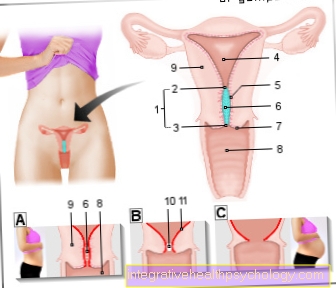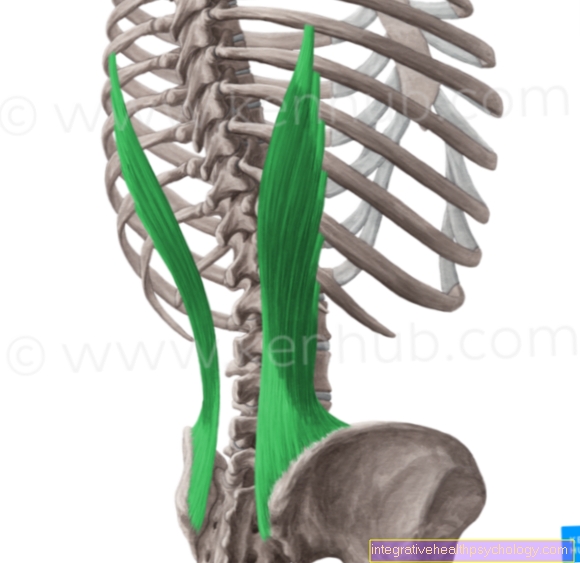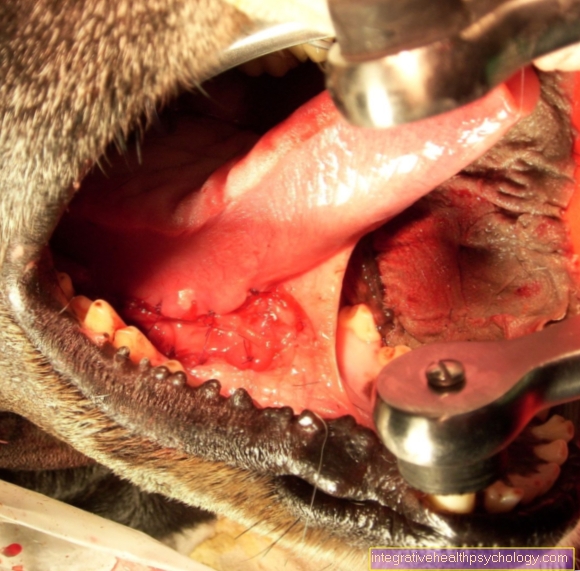Alendronic acid
introduction

Alendronic acid is a drug that is used to treat osteoporosis. The drug belongs to the group of bisphosphates, they are chemical compounds that contain two attached phosphate groups.
However, common medicines do not contain an acid, as the name "alendronic acid" suggests, but rather its salt (monosodium salt.
For this reason, the drug name "alendronate", which is also common, is a far more appropriate name.
Manufacturer
Alendronic acid is, for example, under the trade name Fosamax ® the company MSD SHARP & DOHME GMBH on the market.
Alternative preparations
- Fosavance®, Bonviva®, Aclasta® (each bisphosphonate)
- Protelos® (strontium)
- Prolia® (antibody)
- Evista® (smore elective ÖestrogenR.eceptorM.modulator (SERM))
Mechanism of action
Alendronic acid or Alendronate has an inhibiting effect on various Proteins of the bone-degrading osteoclasts. In the course of this, they are prevented from resorbing the bone substance.
In addition, the active ingredient will have an activating influence on the bone-forming osteoblasts said.
In summary, when taking alendronic acid, the Inhibited bone loss and the density of the bones increases the risk of Broken bones is ultimately reduced enormously.
application areas
Especially with women during and after Menopause / menopause it may be due to the falling Estrogen levels to break down bone density and to osteoporosis come.
Alendronic acid can in the course of this phenomenon with a dosage of up to 10 mg per day or 70 mg per week be applied.
Experience has shown that this measure increases the bone density of the women concerned and effectively reduces the risk Vertebral fracture and Femoral neck fracture.
Reductions in bone density and osteoporotic diseases are also not uncommon in men.
They are mostly with the man Adrenal hormones, so-called Steroid hormones, involved in the development of osteoporosis.
In these cases, alendronic acid can be taken in tablet form with up to 10 mg.
Side effects of alendronic acid
The list of adverse drug reactions (in short: Side effects of alendronic acid) is comparatively long.
Those caused by ingestion manifest themselves particularly frequently Problems in the gastrointestinal tract and / or in the field of Musculature to be mentioned as a side effect.
Many patients report moderate to severe effects while taking alendronic acid stomach pain and nausea.
In addition, swallowing and / or digestive disorders are often up to Constipation laments. Also the appearance of partially liquid Diarrhea and Flatulence are not uncommon in connection with alendronic acid therapy.
In particularly severe cases, the following even occurred:
- Tarry stools (Melena, corresponds to fresh blood in the stool)
- Stomach ulcers
- Perforations (Gastric perforation)
and - Bleeding in the gastrointestinal tract
The upper sections of the digestive tract are particularly often affected.
In the area of the esophagus, therapy with alendronic acid can cause inflammatory reactions (Esophagitis) favor.
Besides, it can too Constriction of the esophagus (so-called strictures) and ulcers in the mouth and throat (ulcers).
A Reflux from Stomach acid into the esophagus with subsequent development of inflammatory processes in the lower part of the esophagus (Reflux esophagitis) is another side effect that should not be underestimated.
Alendronic acid can also be administered to the muscles Muscle spasms and cause moderate to severe pain.
In addition, some patients report about Joint pain and or Bone pain.
In addition, the medicine can prevent a headache promote and cause symptoms like confusion up to Hallucinations to lead.
Strength Reddening of the skin (called erythema), an increased reaction to sunlight, Hives (urticaria), Swelling of the skin and mucous membranes, as well Inflammation of the eyes are also side effects of alendronic acid.
Alendronic acid supposed to cause osteonecrosis, i.e. death of the Bone being able to lead. Pine necrosis is particularly mentioned here. This is particularly important when implanting Dental implants an important role.
Contraindications
Alendronic acid may with any hypersensitivity and after one allergic reaction against the main active ingredient or other ingredients of the Drug not be taken.
In addition, patients who attend Diseases of the esophagus (for example, esophagitis or reflux esophagitis) urgently not to take this drug, as the clinical picture could worsen.
Also an existing one Renal failure is a contraindication to taking alendronic acid.
After consultation with the attending physician and under strict, close control, alendronic acid can also be used by patients who have:
- Difficulty swallowing
- Changes in the lining of the esophagus (Esophagus)
- Inflammation of the lining of the stomach (gastritis)
- Inflammation of the duodenum
and - suffer from other diseases of the gastrointestinal tract
be taken.
Alendronic acid must not be taken at all if it is present Hypocalcemia (calcium levels too low), Bleeding in the stomach (even with increased risk) and pronounced Vitamin D deficiency.
Especially in the first time after surgery in the area of the oral cavity, the throat and / or the Esophagus (esophagus) the start of alendronic acid should be postponed.
Furthermore, alendronic acid must not be taken during an existing pregnancy and the subsequent breastfeeding period, as a negative influence on the development of the child cannot be ruled out.
Please also read our topic: Medication during pregnancy
Miscellaneous to alendronic acid
Medicines containing alendronic acid require a prescription, which is why they may only be used under strict medical prescription.
The drug should be taken with sufficient fluid before meals.





























